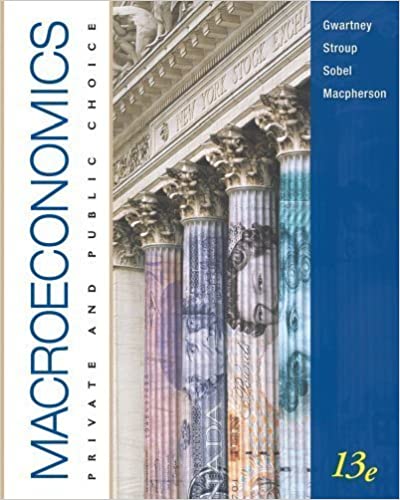
Microeconomics 13th Edition by Russell Sobel, David Macpherson, Richard Stroup, James Gwartney
Edition 13ISBN: 978-0538452281
Microeconomics 13th Edition by Russell Sobel, David Macpherson, Richard Stroup, James Gwartney
Edition 13ISBN: 978-0538452281 Exercise 1
Indicate how each of the following changes would influence the incentive of a decision-maker to undertake the action described.
a. A reduction in the temperature from 80° to 50° on one's decision to go swimming
b. A change in the meeting time of the introductory economics course from 11:00 A.M. to 7:30 A.M. on one's decision to attend the lectures
c. A reduction in the number of exam questions that relate directly to the text on the student's decision to read the text
d. An increase in the price of beef on one's decision to buy steak
e. An increase in the rental rates of apartments on one's decision to build additional rental housing units
a. A reduction in the temperature from 80° to 50° on one's decision to go swimming
b. A change in the meeting time of the introductory economics course from 11:00 A.M. to 7:30 A.M. on one's decision to attend the lectures
c. A reduction in the number of exam questions that relate directly to the text on the student's decision to read the text
d. An increase in the price of beef on one's decision to buy steak
e. An increase in the rental rates of apartments on one's decision to build additional rental housing units
Explanation
a) The decrease in temperature will decrease a person's desire to go swimming as the weather will be relatively colder now. Hence, the incentive for one to want to swim is weak in this case.
b) The change in the timings of the lecture from 11:00 A.M to 7:30 A.M will see a decrease in a student's desire to attend the introductory economics lectures. It is because the opportunity cost of skipping introductory lectures is low, however, the opportunity cost of waking up in the morning and going for lectures in the morning is high in terms of the forgone leisure of sleeping some more. Hence, the incentive to attend the lectures will be less in this case.
c) It is highly likely that one will refer the book less with a decrease in the number of direct questions being asked from the book, because the certainty to score high is less. Hence, in this case also the incentive is weak.
d) It will decrease the purchase of steaks because the beef has become costlier and an individual will buy its substitutes instead.
e) An increase in the rent will increase one's desire to construct more rental apartments because higher rents mean higher profits in constructing apartments.
b) The change in the timings of the lecture from 11:00 A.M to 7:30 A.M will see a decrease in a student's desire to attend the introductory economics lectures. It is because the opportunity cost of skipping introductory lectures is low, however, the opportunity cost of waking up in the morning and going for lectures in the morning is high in terms of the forgone leisure of sleeping some more. Hence, the incentive to attend the lectures will be less in this case.
c) It is highly likely that one will refer the book less with a decrease in the number of direct questions being asked from the book, because the certainty to score high is less. Hence, in this case also the incentive is weak.
d) It will decrease the purchase of steaks because the beef has become costlier and an individual will buy its substitutes instead.
e) An increase in the rent will increase one's desire to construct more rental apartments because higher rents mean higher profits in constructing apartments.
Microeconomics 13th Edition by Russell Sobel, David Macpherson, Richard Stroup, James Gwartney
Why don’t you like this exercise?
Other Minimum 8 character and maximum 255 character
Character 255


